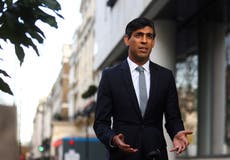Government failures over schools are wide-ranging and carry collective responsibility
Editorial: Firing Gavin Williamson, though tempting, would resolve nothing if his successor continues with the same policies and has to deal with the same dysfunctional Whitehall machine

Allegra Stratton, or the “voice of Boris”, as the prime minister’s new official spokesperson may become known, has begun her duties with quite a splash. Consciously or not, she has helped to further undermine the unstable political vehicle known as Gavin Williamson. Ms Stratton stated, referring to the favourite for the sack: “It’s a huge brief and the prime minister believes the education secretary is doing it [the job] to his utmost ability.”
As students of Whitehall code will well understand, that is the kind of faint praise that usually presages a fall from grace.
Who knows who was responsible for the most recent schools fiasco? Given the political profile of the issue, it is difficult to believe that the dithering paws of Boris Johnson were entirely absent. The more probable explanation for threatening heads with legal action for closing schools, opening them for one day, then shutting them down the next, lies with the usual interdepartmental wranglings, plus chaos at No 10. That has, after all, been the pattern since last spring, and right across government. The failures are wide-ranging and carry collective responsibility. The rest is mere blame-throwing.
Mr Williamson did his utmost to defend the government’s record (and his job). He announced, almost casually, that SATs would be cancelled along with GCSE and A-level exams. He was going to make more laptops available, and train teachers to make the most of the digital world. Lessons would be learnt about algorithms.
The BBC was once again thanked for restoring what used to be called schools programming. It would be nice, by the way, if some Conservative MPs turned down their rhetoric about the BBC’s (non-existent) bias, especially now it has a former Goldman Sachs banker who has donated to the Tories as its chair. The BBC does not deserve to be “defunded”.
As in other areas of life, the recent experience of Covid has given a push to schools entering the digital age. In-person and in-class teaching is vastly superior for the intellectual and social development, but the new technologies and techniques will have their place. A child at home with a mild cold, say, might in future still participate in learning via Zoom.
In the shorter term, there remain gaps in emergency provision. The Covid crisis has highlighted the fact that many children do not have practical internet access. Many will be in crowded homes with no dedicated space for study, and many distractions. For them, it might be worth asking whether they could join the children of key workers and “vulnerable” pupils in the classroom. The alternative for them is effectively no education at all.
There is still little official acknowledgement of the impact of school closures on parents. Those who have to go out to work, but are not “key” are placed in an impossible position without adequate financial support. The hardship is obvious, and the risk to the welfare of children is also clear. The working poor, the “just about managing” as they used to be known, are among the worst economic victims of the pandemic.
Firing Mr Williamson, though tempting, would resolve nothing if his successor continues with the same policies and has to deal with the same dysfunctional Whitehall machine. All that any minister can do now is to wait and pray that the vaccines arrive and the weather improves as spring approaches.



Join our commenting forum
Join thought-provoking conversations, follow other Independent readers and see their replies
Comments